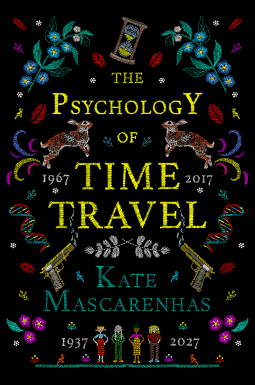
The Psychology of Time Travel
by Kate Mascarenhas
This title was previously available on NetGalley and is now archived.
Send NetGalley books directly to your Kindle or Kindle app
1
To read on a Kindle or Kindle app, please add kindle@netgalley.com as an approved email address to receive files in your Amazon account. Click here for step-by-step instructions.
2
Also find your Kindle email address within your Amazon account, and enter it here.
Pub Date Aug 09 2018 | Archive Date Sep 17 2018
HarperCollins Publishers Australia | Head of Zeus
Talking about this book? Use #ThePsychologyOfTimeTravel #NetGalley. More hashtag tips!
Description
'An astonishing debut ... Breathtakingly tender and wryly understated' NEW YORK TIMES.
'Genre-defying ... Witty and inventive' GUARDIAN.
1967.
Four female scientists invent a time travel machine. But then one of them suffers a breakdown and puts the whole project in peril...
2017.
Ruby knows her Granny Bee was the scientist who went mad, but they never talk about it. Until they receive a message from the future, warning of an elderly woman's violent death...
2018.
Odette found the dead women at work – shot in the head, door bolted from the inside. Now she can't get her out of her mind. Who was she? And why is everyone determined to cover up her murder?
'A page-turning temporal safari. Part murder mystery, part extrapolation of a world in which time travel has become a commercial reality, it is written with an acute sense of psychological nuance' GUARDIAN.
'Intriguing and multi-layered' DAILY MAIL.
'Captivating, delightful and thoroughly original' JENNIE MELAMED.
'Troubling and inspiring, comforting and horrifying' SCIFINOW.
Available Editions
| EDITION | Other Format |
| ISBN | 9781788540117 |
| PRICE | £12.99 (GBP) |
| PAGES | 368 |
Average rating from 11 members
Featured Reviews
 Alyssa M, Reviewer
Alyssa M, Reviewer
If you're a fan of a murder mystery, how cool does a time travel murder mystery sound? The Psychology of Time Travel, the debut novel by Kate Mascarenhas, is exactly that, and much more.
In 2018, archaeology student Odette finds a dead body in the basement of the toy museum where she volunteers. The elderly woman is riddled with bullets, but no one knows who she is. The door was locked from the inside and there's no weapon. Odette replays the scene in her mind and becomes obsessed with solving the mystery - who is the victim? And who is the murderer?
In 1967, four female scientists invent time travel. Margaret, Grace, Lucille and Barbara invite the BBC to witness their achievement but the interview goes horribly wrong when Barbara, for whom time travel has taken its toll, has a mental health breakdown. Soon everyone is talking about 'the time traveller who went mad' and Margaret encourages the other scientists to permanently shut Barbara out or risk jeopardising their whole operation.
In 2017, Barbara and her psychologist granddaughter, Ruby, receive a mysterious letter foretelling the death of a woman five months into the future. Who sent the letter and how do they know about a death that hasn't happened yet? Worse still, does the letter predict the death of Barbara (Granny Bee)?
In her debut novel, Kate Mascarenhas has created a detailed and absorbing alternate version of reality. Time travel is controlled by an organisation called the Conclave, headed by power-hungry Margaret. Time travellers wear a tracker watch that counts heartbeats to determine what year they'd be in if they'd lived their life in chronological order. Multiple selves co-exist in the same timeline including several versions of oneself attending their own funeral. There's also a bacteria called macromonas, generated by time travel and which can be fatal.
The novel explores the consequences of time travel including its impact on mental health and how it is dealt with. In an interview with Head of Zeus, chartered psychologist Mascarenhas has said she was influenced by psychological screening tests conducted by NASA and an appendix at the end of the book contains a detailed psychometric test for time travellers indicates just how thorough Mascarenhas has been in her world building for this novel.
It also delves into attitudes towards death. As time travellers can visit loved ones, and versions of themselves after they have passed away, the Conclave introduces compulsory initiation rituals for new time travellers (known as 'wenches') to neutralise their responses to death. The impact of these rites is that time travellers become alienated from others, as one character muses: "I like watching people have emotions I don't feel anymore."
The Psychology of Time Travel is noteworthy for its large cast of entirely female viewpoint characters, all of whom are diverse and representational. The story is strengthened by the core relationships between these characters including familial (mother/daughter, grandmother/granddaughter) and romantic, particularly the relationship between present-day Ruby and past Grace which references a beautifully written allegory - 'my life is a ring of a very strange shape'.
A thought-provoking and deeply original novel that will leave you believing anything is possible.
The Psychology of Time Travel made me feel like I was reading about time travel for the first time - it focused not on the ins and outs of how time travel might work, but on the impact it might have on the people who time travel.
This is time travel like you’ve never seen it before. Four trail blazing women have a breakthrough in 1967, creating the first time-machine ever. Bee can’t handle the stress and has a breakdown. Margaret pushes her out. In 2017, Bee’s granddaughter, Ruby, wonders what life would be like if her grandmother was still one of the pioneers. No one talks about it. Until a note from the future arrives - a woman connected to them will die. In 2018, Odette finds the body of a murdered woman. The sight haunting her she embarks on a mission to find out what happened attempting to banish the images from her mind.
Debut author Kate Mascarenhas uses her background in psychology to create a beautiful, thought provoking story set in an altered reality. And wow did she make me think. The discussion of the mental health of each traveler, along with the superb mystery, were refreshing and fascinating keeping me riveted in this book. While I was picking my way though the story, much like a detective trying to work out what was going on, the real emphasis was quietly insinuating itself. After each reading session I found myself musing – if someone told me part of my future would I continue that path knowing it would happen? Would my mind cope with the extra information? Would knowing certain things desensitize me? Would I become accustomed to the death of my loved ones, if I knew I could go back and see them again? What would this do to my relationships? What would this do to me? I was rather surprised to find myself dipping into deep philosophical thoughts whilst reading a sci fi/mystery book.
The story is told via each intricately complex character, in the time they are currently residing in. Whilst the skipping back and forth between times can be confusing, every slip in time is incredibly important in tying everything together. As the time periods get closer to the present day the gaps between them shorten and you realize who the central characters really are. Each one gave me the feels. I wanted to hug Bee and slap Margaret. I was proud of Odette and Siobhan. I was frustrated with Angharad and Ginger. I wanted to high five Elspeth and Lucille. I fell in love with Grace and Ruby. I may not have been able to fully identify with each of them completely, but so many of their actions and thoughts gave me something to connect to.
It is surprising that while I spent an inordinate amount of time questioning how the mind works, it took me awhile to realize the hints at injustice posed throughout the story specifically relevant to today. The author touches on such as the color of ones skin, the difference between women in power now and 50 years ago, and the stigma towards those with mental health issues. These all hit a cord with me personally. Each aspect is a part of my identity. The issues helped highlight the true focus for me - how we behave towards each other in our relationships, how they change us as individuals, and how we form a relationship with ourselves.
I was completely unprepared for how much I fell in love with these characters. And how much introspection I ended up in. The truth is, time is precious, we are always looking for ways to fit more in and do more with each other. We all have the same fate. Regardless of if I was able to time travel or not, it wouldn’t give me more time. So, I better start using it more wisely.
Readers who liked this book also liked:
Art by S.arang; Adapted by TO WALK(REDICE STUDIO); Original story by Step on a LEGO
Comics, Graphic Novels, Manga, Sci Fi & Fantasy, Teens & YA
L.M Montgomery
Children's Fiction, Comics, Graphic Novels, Manga, Teens & YA







